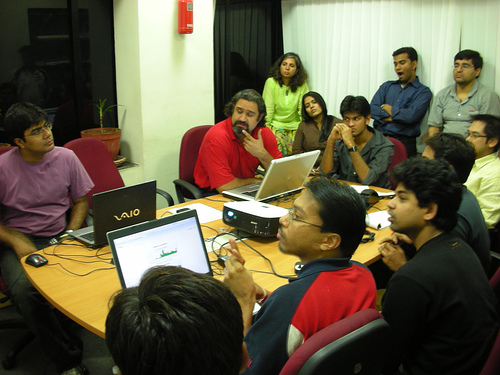Kerry’s article about thick liberalism has generated a ton of intersting discussion. Here’s Ilya Somin, Kerry, and Ilya again. Here’s Will. I still think Kerry and Will are right and Kerry’s critics are wrong, and I won’t re-hash the various excellent points they’ve made. Instead, I’d like to respond to one reader, “Vogateer,” who took issue with the following rather caustic passage of last week’s post: “Unfortunately, when you adopt a political philosophy that fits on a postcard, it leaves a vacuum that is filled by whatever inchoate political prejudices you held before you picked up that copy of Atlas Shrugged at the age of 19.”
“Vogateer” objects, reasonably enough, that this isn’t likely to persuade devotees of the Rand/Rothbard approach to libertarian philosophy. Persuading them wasn’t really the purpose of the post, but he’s right that I owe those folks a more substantive critique. So here it is. I’ll focus mostly on Rand because I’m more familiar with her work.
I think Rand was a better novelist than political philosopher. Her early novels actually do a reasonably good job of sketching out a “thick” worldview—a “sense of life,” as she put it—that I found inspiring when I read The Fountainhead in high school. Although the novel ends up with the protagonist blowing up an (empty) government housing project, it isn’t a political tract. Rather, it’s a novel about artistic integrity and the primacy of individual conscience over decision-making by committee.
It seems that by the time Rand began working on Atlas Shrugged, she was starting to see herself as a political philosopher first and a novelist second. She increasingly tried to translate the implicit “sense of life” of her novels into an explicit system of philosophical ideas, and unfortunately, the result was rather one-dimensional. Rand’s basic approach to political philosophy is a top-down, deductive one: start with some general propositions like “A is A” and then logically derive from these principles an entire philosophical system: rational selfishness, capitalism, and so forth.
In her haste to boil each question down to a single, pithy aphorism, Rand repeatedly ignored the nuances and complexities in the real world that produce political disagreements in the first place. The result is that many of her conclusions were driven by her own idiosyncratic preferences. Hence her hostility to (for example) homosexuality, pornography, and female presidents.
Beyond those individual foibles, I think there was a deeper problem with Rand’s approach to political philosophy. We can see this in the debate over what’s commonly referred to as “intellectual property.” Rand’s best known (and as far as I know, only) essay on the subject (in Capitalism: The Unknown Ideal) runs barely 5 pages. She writes that “patents and copyrights are the legal implementation of the base of all property rights: a man’s right to the product of his mind,” and that “patents are the heart and core of property rights.”
In contrast, the modern followers of Murray Rothbard, who start with a virtually identical formulation of the libertarian non-aggression principle, reach the diametrically opposite conclusion: that copyrights and patents are not legitimate property rights but illegitimate government monopolies, and accordingly should be abolished.
The result is an impasse that has bedeviled the libertarian movement for decades. Because libertarians are used to analyzing all policy questions by reference to the non-aggression principle, we have difficulty adjudicating disputes where there are two diametrically opposed and equally plausible interpretations of the principle: If copyright is property, then libertarian principle demands that they be strictly enforced. If copyright is not property, then libertarian principle demands that they be abolished. Debates between the two sides tends to involve of a lot of question-begging, table-thumping, and arguments over semantics.
This is a case where a richer conception of liberty becomes useful. The debate over copyright is really a dispute between two different visions of culture: on the one hand, a top-down vision in which culture is produced by a small number of producers and consumed by a large number of consumers, and on the other a bottom-up vision in which ordinary people have the opportunity to be both producers and consumers. If you subscribe to the former vision, then you’re going to want copyright laws that centralize control over culture in the hands of Hollywood and Redmond, so that they have enough “incentives” to continue producing new content. In contrast, if you see competition and bottom-up innovation as central to the production of culture, then you’re going to be less enthusiastic about laws like the DMCA that give incumbents the power to lock competitors out of the market.
The key thing to note here is that these aren’t disputes that can be settled entirely by reference to political philosophy. The strongest arguments for and against a law like the DMCA don’t turn primarily on whether copyright “really is” a property right. Rather, they focus on how different legal regimes will shape the markets they regulate. In particular, the strongest argument against the DMCA is that it undermines certain kinds of freedom that I, for one, regard as important: the freedom to do as I please with my lawfully-purchased computer and the freedom of third-party software vendors to provide me with software to meaningfully exercise that freedom.
But to form intelligent opinions on a law like the DMCA, you actually have to know something about the world it’s regulating. You have to know something about the software industry to understand how legal restrictions on interoperability are likely to change the structure of the market. And these are not considerations you’re going to find in any work of political philosophy. To understand these things, you need to be engaged in a debate that’s internal to the software industry and not primarily concerned with political philosophy.
The converse approach is illustrated by Stephen Kinsella’s response to my post about the Lakely study. Not once in that post did I mention “intellectual property.” Yet Kinsella not only interprets my post as being about “IP,” he even accuses me of inconsistency for being a pro-IP person and “criticizing libertarians for being pro-IP.” For him, the free software debate is really a debate about “IP” policy. And he has no patience for “thick” conceptions of liberty:
Thickness is actually problematic since it just muddies the waters, conflating issues pertaining to the permissibility of interpersonal violence with other interpersonal norms and institutions. The thickness theorizers add nothing of substance to our understanding of libertarian principle; instead, they pointlessly link the libertarian opposition to aggression to non-rigorous, malleable leftist gremlins like “hierarchy” and “bossism” and “pushing people around.”
“Interpersonal norms and institutions” are important! Richard Stallman’s arguments for free software focus as much on norms and institutions as they do on public policy—and that’s precisely what makes them so interesting. Kinsella seems to believe that the only theories of liberty that matter are those that place the state at their center. This is, in Kerry’s phrase, “state worship,” and it’s as unseemly in libertarians as it is in our ideological opponents.
 So it’s jarring that less than 20 years after one Republican president gave a stirring speech about the barbarity of erecting a wall to trap millions of people in a country they wanted to leave, another Republican president signed legislation to do just that. Conservatives, of course, bristle at analogies between East Germany’s wall and our own, but they seem unable to explain how they actually differ. Certainly Rich Lowry’s effort comes up short. He suggests that the Berlin Wall was “an instrument of repression” while the US-Mexico wall is “a way for a nation of laws to see that those laws are obeyed.” But this is no distinction at all. After all, the East German government was trying to compel obedience to its laws just as we’re trying to compel obedience to ours. The key difference, is whether the laws are repressive. I’ll grant that East German laws are more repressive than our own, but it seems like a difference of degree rather than kind. American law makes it essentially impossible for a low-skilled worker to emigrate or take a job here legally. The Mexican government obviously isn’t as repressive as the East German one was, but if the US-Mexico wall is completed, it’s hard to see how it will look different to the average Mexican than the Berlin wall did to the average East German.
So it’s jarring that less than 20 years after one Republican president gave a stirring speech about the barbarity of erecting a wall to trap millions of people in a country they wanted to leave, another Republican president signed legislation to do just that. Conservatives, of course, bristle at analogies between East Germany’s wall and our own, but they seem unable to explain how they actually differ. Certainly Rich Lowry’s effort comes up short. He suggests that the Berlin Wall was “an instrument of repression” while the US-Mexico wall is “a way for a nation of laws to see that those laws are obeyed.” But this is no distinction at all. After all, the East German government was trying to compel obedience to its laws just as we’re trying to compel obedience to ours. The key difference, is whether the laws are repressive. I’ll grant that East German laws are more repressive than our own, but it seems like a difference of degree rather than kind. American law makes it essentially impossible for a low-skilled worker to emigrate or take a job here legally. The Mexican government obviously isn’t as repressive as the East German one was, but if the US-Mexico wall is completed, it’s hard to see how it will look different to the average Mexican than the Berlin wall did to the average East German.









